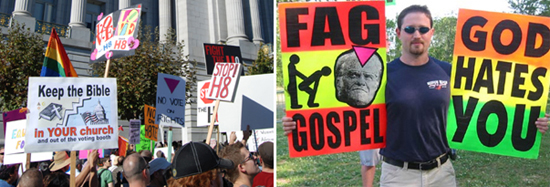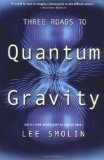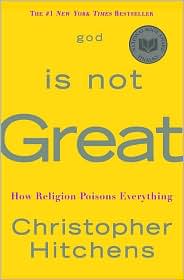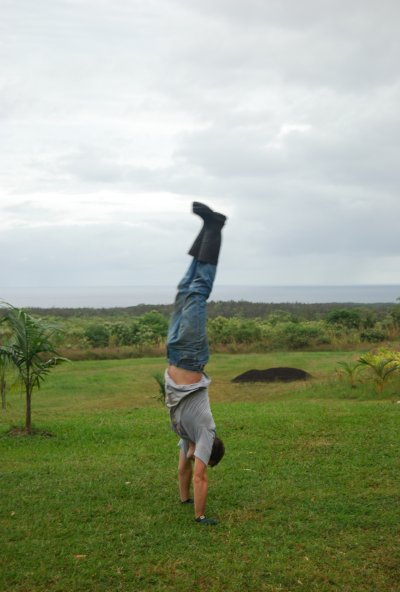Give thanks.
New foes arise,
Threatening to bind our souls with secular chains.
—Milton
Considering those words are over 400 years old, it’s fascinating if somewhat alarming to observe how slowly attitudes change, no matter how rapidly the world seems to be changing around us.
There is a persistent notion these days among social and religious conservatives that is reminiscent of Milton’s fear: the notion that secular attitudes are damaging to Faith and destructive to the Being. Supposedly our moral society is being polluted and our long tradition of agonizing monotheistic beliefs are being threatened with being ground into sand.
Beware the decline
Worst of all, these secular chains are multiplying and growing stronger: witness the desire of same-sex individuals to marry. Witness the enforcement of this country’s foundational doctrines of separation of church and state; the pursuit of liberty; freedom of religion; the pursuit of happiness. All these affronts to moral decency…

Love (brought to you by the LGBT Community) and Hatred (sponsored by the Westboro Baptist…CHURCH !?)
The more extreme the opinion, and regardless which side you’re on (Hypersecular or Asecular), there is an unspoken dictum that states that as long as your opinion toes the party line you are an acceptable individual, not a morally decrepit one. But the fulcrum swings in both directions: as much as the ultra conservatives rail on the immorality of the hyperseculars, the liberal left probably dreams of staking up some of the Christians for the lions to feast upon. (Not that they would ever put it on placards.)
Ah the horrors. The incivility of it all….If not readily visible on your neighborhood streets, then one need only turn on the embarrassing spectacle that is cable “News” to witness the intellectual carnage.
If we survive ourselves, massively fallible race that we are, it may become obvious that paying fair attention to the mysteries of the secular will liberate us in ways that have traditionally been reserved for non-secular dogma; for non-secular celebration and traditions; for presumably divine passages from antiquated texts.
If we succeed in not blowing ourselves to bits, or in not poisoning our bodies into extinction, then perhaps we will learn to be collectively thankful and come to realize that the secular, even though it is far from unblemished, is nevertheless a manifestation of the divine.
Change is the great demon foe of commonfolk. It is the most non-obvious and under-appreciated blessing of all. While we tend to think of change as secular—the rites of human passage, for instance—we’re learning more and more (or reminding ourselves better these days) that life and history are built upon change.




On the secular front I’m thankful for a thought-provoking and expansive quartet from my relatively recent reading list: Lee Smolin’s Three Roads to Quantum Gravity, Christoper Hitchens’ God is not Great, Karen Armstrong’s A History of God, and Elaine Pagels’ The Gnostic Gospels.
Three Roads to Quantum Gravity
Lee Smolin explains that the processes that underscore the life of the universe itself are change-based. Time is not the accumulation of memories; it is a measure of changes in state and position. Even this planet we think of as static is actually in flight. We don’t simply exist on a flat surface on the edge of a gently turning globe; we are sucked onto the face of a spinning orb that is hurling through space at 483,000 miles an hour.
God is Not Great
Christopher Hitchens argues that any reasonable interrogation of organized religion yields a rejection of the many foundations of those creeds, and, by extension, should encourage individuals to dissociate themselves from the organizations. Talk about a change: “If one must have faith in order to believe something, or believe in something, then the likelihood of that something having any truth or value is considerably diminished” (p. 71). It’s an exquisite collection of arguments, filled with rich opinions that have a grotesquely beautiful, almost inspirational and revelatory quality to them. The book itself is an anti-cathedral of the most opulent sort.
A History of God
Karen Armstrong has a different affiliation with God. In a radio broadcast on NPR (maybe at the Commonwealth Club in SF?…I was cooking dinner), she stated that Hitchens’ atheistic doctrine is as much a pedagoguery as the religions he opposes. Her A History of God charts the 4,000 year history of subtle change that underscores adherence to Judaism, Christianity and Islam, while at the same time illuminating how very similar the three religions are. This former nun is probably one of the most important and balanced religious scholars working today.
The Gnostic Gospels
Elaine Pagels makes a close examination of specific, measured changes, as well as the chance-laden landscape of history, that underscored the Catholic Church’s suppression of the more humanistic Gospel of Saint Thomas in favor of the much more non-secular, divinity-focused Gospel of Saint John. The latter of these gospels (St John’s) became the official creed of the new Church—it is the most-recited gospel during Easter—whereas Thomas’ manuscript landed in the reject pile. The book is a fantastic observation of how change, intentional and specific, can be used to manage faith, as well as thought.
We should all be thankful for all things in life, good and bad. Yes yes, it’s easy to be grateful for the obvious: family and friends. They help us weather ill health, rape and genocide in Africa, the scourge of human history, ideoextremists who wish us death—all the heinous things we do to one another and to ourselves in the name of greed and religion.
Friends and family help us weather a 40% drop in the value of our retirement accounts and the litany of sour news pouring forth as our senior American generation is heard remarking that they’d never thought they would have to live through another Depression.
Friends and family make the beautiful things in life more beautiful—a crisp sunny Virginia morning, a piano concerto played against the background scent of mulling spice, the scintillating lines of a well-crafted book tickling the brain, the soft leaves of its cover like warm bread between the hands.
Beyond this, I am extremely grateful for the uncommon things: secular opinions, the failings of the human race, my own foibles and tenuousness, the hard rocks and gases of outer space.
 A few months ago I took up yoga again, after a brief flirtation 25 years ago with asanas and pranayama, which is the exercise of moving air (one’s breath) through your body as you move into yogic positions. Each day of practice I dedicate the session to a different goal or emphasis: for example, focus, patience, being less critical, compassion… Today’s yoga practice was dedicated to embracing all aspects of my life – the mixed bag of how I make my living (a clumsy structure of orderly disorder governing multiple projects) paired with, and in constant conflict with, my writing. In other words, I dedicated today’s practice to embracing chaos.
A few months ago I took up yoga again, after a brief flirtation 25 years ago with asanas and pranayama, which is the exercise of moving air (one’s breath) through your body as you move into yogic positions. Each day of practice I dedicate the session to a different goal or emphasis: for example, focus, patience, being less critical, compassion… Today’s yoga practice was dedicated to embracing all aspects of my life – the mixed bag of how I make my living (a clumsy structure of orderly disorder governing multiple projects) paired with, and in constant conflict with, my writing. In other words, I dedicated today’s practice to embracing chaos.




